
Looking for citrus Picking Tips in 2024? Scroll down this page and follow the links. And if you bring home some fruit or vegetables and want to can, freeze, make jam, salsa or pickles, see this page for simple, reliable, illustrated canning, freezing or preserving directions. There are plenty of other related resources, click on the resources dropdown above. If you are having a hard time finding canning lids, I've used these, and they're a great price & ship in 2 days.
If you have questions or feedback, please let me know! There are affiliate links on this page. Read our disclosure policy to learn more.
What's in season in April 2024, and other timely information:
Notes for April 2024: Spring is here! Strawberry season is here. It started in February in Florida, Texas, southern California and a few other areas of the Deep South; then March along the Gulf coast, April in the Deep South and west coast, May through much of the country, and June in northern areas. Blueberries are next, about a month later. Of course, cool weather crops, like Rhubarb, asparagus and greens should be available almost everywhere. Check your area's copy calendar (see this page) and call your local farms for seasonal updates.
You may also be interested in finding a local:
- Children's Consignment Sale happening now; save money on children's clothes, toys, books, etc, find a local children's consignment sale, also often held by churches in the Spring and Fall, click here!
- Fun factory tours - usually free, fun and educational, find them in every state here!
- Road trip or a Camping trip - Find free and low-cost, but fun, interesting places to visit and things to do and see!
We also have home canning, preserving, drying and freezing directions. You can access recipes and other resources from the drop down menus at the top of the page or the site search. If you have any questions or suggestions, feel free to write me! It is easy to make your own ice cream, even gelato, or low fat or low sugar ice cream - see this page. Also note, there are many copycat website listing U-pick farms now. They have all copied their information from here and usually do not ever update. Since 2002, I've been updating the information every day but Christmas; so if you see anything wrong or outdated, please write me!
Picking Citrus Fruit: Tips and Tricks to Getting the Best oranges, grapefruit, lemons, mandarins and tangerines
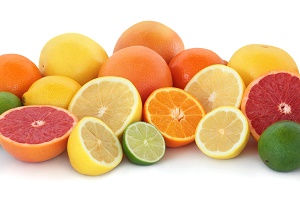 Citrus
fruit, like oranges, grapefruit, lemons, mandarins and tangerines
are easy to pick and use, if you are lucky enough to live in the semi-tropical
climates where they grow.
Citrus
fruit, like oranges, grapefruit, lemons, mandarins and tangerines
are easy to pick and use, if you are lucky enough to live in the semi-tropical
climates where they grow.
In the US, that means southern California, Arizona, New Mexico, southern Texas, Florida and sometimes in southern Louisiana and Mississippi. Citrus are fat-free, low sodium, and cholesterol-free.
Citrus Picking tips:
Most modern orange, grapefruit, mandarin or tangerine orchards have dwarf trees that are very close to the ground - my 3 year old finds it easy to pick citrus! (photo above and below)
Select The color can be anything from dark
green, to yellow, pink, orange, bright red, dark red or even a combination.
It all depends on the variety. And color is not really how you tell when
a citrus fruit is ripe. The key will be to ask the farmer which are ripe.
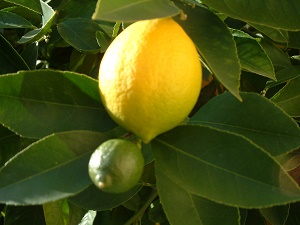
-
Look for firm, bruise-free skin
-
Look for a heavy, solid feel to the fruit. heavier and more solid means juicier!
-
The dimples should have small, fine dimples on the peels
-
Watch out for soft, tender spots or wrinkled, folds in the rind.
-
The smell of the the fruit should be a strong, sweet citrusy smell.
The farmer/orchardist will also know what characteristics to look for in the particular varieties that he is growing.
When are citrus ripe - how to tell!
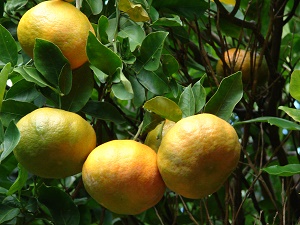 Citrus ripen from the outside of the tree towards the center, so the
citrus out
the outside of the tree will ripen first. Once they are picked, they stop
ripening. Picking citrus directly from a tree is easy.. abut uniform
orange color is not necessarily an indicator of a delicious, juicy orange.
Notice the photo at right.
Citrus ripen from the outside of the tree towards the center, so the
citrus out
the outside of the tree will ripen first. Once they are picked, they stop
ripening. Picking citrus directly from a tree is easy.. abut uniform
orange color is not necessarily an indicator of a delicious, juicy orange.
Notice the photo at right.
The best way to know if a citrus fruit is ripe is the smell and taste. Try one and you will know what to look for in appearance and smell with the others.
When are Citrus in season?
Keep in mind that these are typical, general dates. It can vary considerably upon weather, location, orchard and variety.
-
Navel oranges - November to June.
-
Valencia oranges - March to October.
-
Cara Cara oranges December to May.
-
Clementine oranges -October to December
-
Satsuma - October to January.
-
Pineapple sweet oranges - November to February.
More Tips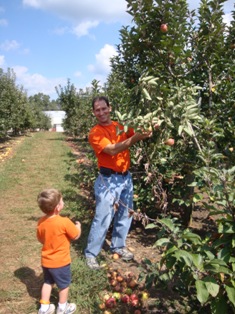
- Once picked, don't throw the citrus into the baskets, place them in gently, or they will bruise and go bad more quickly.
- Don't wash citrus until just before using to prevent spoilage.
-
Keep citrus cool after picking to increase shelf life. A cool
basement is ideal, but the fruit/vegetable drawer of a refrigerator will
work, too. Kept cool, fresh-picked citrus will generally keep weeks, but it
DOES depend on the variety. Red and Yellow Delicious citrus do not keep
well, for example; but Rome, do! High humidity helps to to keep the citrus
from shriveling, but don't let them get actually wet. A wet towel placed
nearby helps to keep the humidity up. A refrigerator is fine for small
quantities of citrus. Boxed citrus need to be kept in a cool, dark spot
where they won't freeze.
Prevent contact between citrus stored for the winter by wrapping them individually in sheets of newspaper. The easiest way to do this is to unfold a section of newspaper all the way and tear it into quarters. Then stack the wrapped citrus - Nutrition and miscellaneous facts: One-half cup of citrus is only 42 calories. Citrus contain no cholesterol or fat and are also low in calories. T Citrus are high in dietary fiber, Vitamin A and niacin. They contain iron and other trace minerals and are a fair source of Vitamin C.
- Citrus are ranked No. 1 in Vitamin C and antioxidant activity compared with many other commercially available fruits and vegetables. That means a serving of citrus has more of the antioxidant power you need to fight aging, cancer and heart disease.
Storing Citrus
In a refrigerator, citrus can last 2 or3 weeks.. Keep them in a bag that has holes for airflow, ie. they have a few holes in them . The airflow is important to prevent buildup of moisture or condensation which causes mold growth.
At room temperature, Citrus will keep for about a week.
Recipes and Preserving Citrus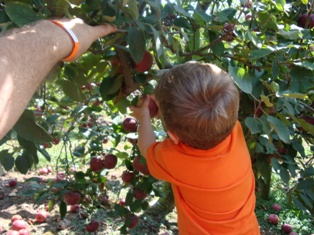
Canning and freezing citrus - fully illustrated, with step-by-step instructions
- How to can oranges, grapefruit, lemons, limes, tangerines, clementine's and other citrus
- How to make home-canned orange juice or other citrus juices
- How to make home-canned lemon juice or other citrus juices
- How to freeze orange, lemon, grapefruit or other citrus juices
Marmalades, Jellies, and Other Recipes, illustrated with step by step instructions
Citrus weights and measures
The weight of the citrus fruit, and the number of fruit per bushel varies depending on the size of the fruit , their moisture content and variety. But, in general:
-
1 bushel = 48-72 oranges or 32-48 grapefruit.
-
3/4 bushel = 36-54 oranges or 24-36 grapefruit
-
1/2 bushel = 24-36 oranges or 16-24 grapefruit
Citrus Festivals
Here is a list of Florida citrus festivals If you know of any more, please write me! Feedback
Looking for canning equipment and supplies?
Water bath canner with a jar rack
Pressure canners for gas, electric and induction stoves: Presto 23Qt or T-fal 22Qt
Canning scoop (this one is PERFECT)
Ball Blue book (most recent version)
Find Other types of farms:
- Easter egg hunts
- Children's consignment sales
- Farm markets and roadside stands
- Road trips and camping resources
- Local Honey, apiaries, beekeepers
- Local Meat, Milk and Eggs
- Consumer fraud and scams information
- Home canning supplies at the best prices on the internet!
- Maple Syrup Farms, sugarworks, maple syrup festivals
- Environmental information and resources
- Farms For Your Event for birthday parties, weddings, receptions, business meetings, retreats, etc.
- Festivals - local fruit and vegetable festivals
- Pumpkin patches and corn mazes
- Christmas Tree Farms and lots
Get the
most recent version of
the Ball Blue Book
Get the
most recent version of
the Ball Blue Book of Home Canning
Find other types of farms:
- Easter egg hunts
- Children's consignment sales
- Farm markets and roadside stands
- Local Honey
- Local Meat, Milk and Eggs
- Road trip and camping
- Pumpkin patches and corn mazes
- Christmas Tree Farms and lots
- Maple Syrup farms and sugarworks
Highly rated canning supplies:
- Regular Mouth Canning Lids with food-grade with BPA Free Silicone seals for Ball, Kerr Jars for Canning
- Canning accessories kit: funnel, jar tongs, lid lifter, etc
- Food Dehydrator, 400W Electric with 8 Trays, 48 hour Timer and Temperature Control 95-176℉, BPA-Free
- Water Bath Canner, 21 Qts with lid, Jar Rack, Speckled Black, cans 7 quart jars, 9 pint jars or 13 half-pint jars
- Air Fryer: Instant Pot Instant Vortex Plus XL 8QT Clear Windows, Custom Programming, 8-in-1 Functions that Crisps, Broils, Roasts, Dehydrates, Bakes, Reheats
- Pressure canner: All American 921, 21.5qt Pressure Cooker/Canner, never needs gaskets, Great for Gas, Electric or Flat Top Stoves - Made in the USA
- The Backyard Homestead:a guide to homesteading , on 1/4 acre, how to raise grains and vegetables; raise animals for meat, eggs, and dairy; and keep honey bees
- Smart silent HEPA Air Purifiers for Home, Large Rooms for Allergies, Smoke, Pets. Eliminates 99.97% of Dust, Pet Hair, Odors


